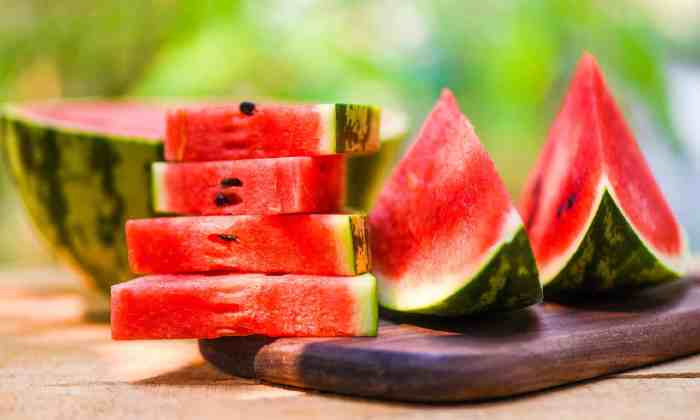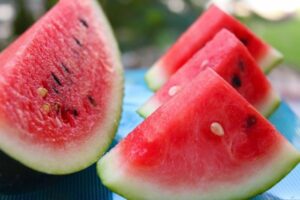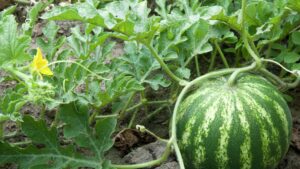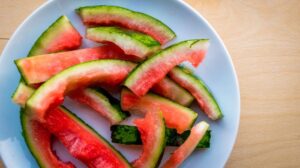Is a watermelon a vegetable or a fruit? It’s a question that has puzzled many people over the years. The answer, however, is not as simple as it may seem.
Botanically speaking, a fruit is the ripened ovary of a flowering plant. It contains the seeds of the plant and is typically sweet and fleshy. A vegetable, on the other hand, is any other part of the plant, such as the roots, stems, or leaves.
Definition and Classification
In the realm of botany, a fruit is defined as the mature ovary of a flowering plant, typically containing seeds. Vegetables, on the other hand, encompass a broader category, referring to all other edible plant parts, including roots, stems, leaves, and flowers.
The great debate rages on: is a watermelon a vegetable or a fruit? While we ponder this culinary conundrum, let us not forget the often-overlooked rind. Can you eat the rind of a watermelon? The answer, my friends, lies within the depths of this enlightening treatise . Return now to our original question: is a watermelon a vegetable or a fruit? Ah, the mysteries of the culinary world!
Traditional Culinary Classification
Culinary traditions have long classified watermelons as fruits, owing to their sweet, juicy flesh and the presence of seeds. This categorization aligns with the botanical definition of a fruit, as watermelons do indeed develop from the mature ovaries of flowering plants.
Is a watermelon a vegetable or a fruit? The debate rages on, but one thing is for sure: chickens love watermelon! Can chickens have watermelon ? Yes, they can, and it’s a great treat for them. So next time you’re wondering what to feed your chickens, reach for a watermelon.
Scientific Perspective

From a botanical standpoint, the classification of a watermelon as a fruit or vegetable hinges on its plant anatomy and the development of its seeds. Let’s delve into these aspects to determine the true nature of this enigmatic fruit.
Whether a watermelon is a vegetable or a fruit has long been debated. Some argue that it is a fruit because it contains seeds, while others insist that it is a vegetable due to its savory taste. Regardless of its classification, one thing is for certain: watermelons can put on a dazzling display when they are ripe.
For a truly unforgettable experience, be sure to check out where to watch twinkling watermelon . You won’t believe your eyes!
Role of Seeds in Classification
In the realm of botany, fruits are defined as the mature ovaries of flowering plants that contain seeds. Conversely, vegetables encompass all other plant parts, including stems, leaves, roots, and immature ovaries. In the case of watermelon, its fleshy interior encases numerous seeds, indicating its status as a fruit.
Nutritional Value and Culinary Uses
Watermelons are a rich source of vitamins and minerals, making them a nutritious choice. They contain high amounts of vitamin C, which is essential for immune system function, and vitamin A, which is important for vision and skin health. Watermelons also contain potassium, which helps regulate blood pressure, and magnesium, which supports muscle and nerve function.
In terms of caloric content, watermelons are relatively low in calories, with only about 46 calories per cup. This makes them a good option for people who are trying to lose weight or maintain a healthy weight.
Culinary Applications
Watermelons are a versatile fruit that can be used in a variety of culinary applications. They can be eaten fresh, juiced, or used in smoothies. Watermelons can also be used in salads, soups, and desserts. One popular way to enjoy watermelon is to grill it, which brings out its natural sweetness and flavor.
Whether a watermelon is a vegetable or a fruit has been debated for centuries, but one thing is for sure: they’re a delicious and refreshing treat. But how long do watermelons last? The answer depends on a few factors, such as the variety of watermelon, how ripe it is, and how it’s stored.
Here’s a guide to help you keep your watermelons fresh and flavorful for as long as possible. But whether you consider it a vegetable or a fruit, there’s no denying that watermelons are a summertime staple.
Watermelons are also a good source of lycopene, an antioxidant that has been linked to a number of health benefits, including reduced risk of heart disease and cancer.
Watermelon, a refreshing summer treat, sparks the age-old debate: is it a vegetable or a fruit? Botanically, it’s a fruit, but culinarily, it’s often grouped with vegetables. This dual nature extends to our furry friends. Can guinea pigs have watermelon? The answer lies in the link here , where you’ll discover the sweet truth about watermelon and its suitability for our beloved cavies.
The nutritional benefits and potential risks are carefully explored, guiding you in providing a healthy and balanced diet for your tiny companions.
Cultural and Historical Context

Watermelons have a rich cultural and historical significance that spans different regions and time periods. Their sweet and juicy flesh, coupled with their vibrant appearance, has made them a beloved fruit across cultures.
Historical Evolution, Is a watermelon a vegetable or a fruit
Watermelons originated in Africa and were domesticated in ancient Egypt around 5000 BC. They were prized by the Egyptians for their nutritional value and medicinal properties. From Egypt, watermelon cultivation spread to other parts of the Mediterranean, Middle East, and eventually to the Americas by European explorers.
In the United States, watermelons became a staple food in the South, particularly among enslaved African Americans. They were grown in gardens and served as a source of hydration, nourishment, and refreshment during the hot summer months.
Cultural Significance
In many cultures, watermelons are associated with summer, festivals, and celebrations. In China, watermelons are often gifted during the Mid-Autumn Festival, symbolizing prosperity and abundance.
In Japan, watermelons are a traditional summer treat and are often enjoyed at festivals and picnics. They are also used in decorative arrangements and art.
In the United States, watermelon is often associated with Independence Day and summer barbecues. It has become a symbol of summer gatherings and festivities.
End of Discussion: Is A Watermelon A Vegetable Or A Fruit
So, is a watermelon a vegetable or a fruit? The answer is both. It is a fruit because it contains the seeds of the plant. However, it is also a vegetable because it is not sweet and fleshy.
FAQ Resource
What is the difference between a fruit and a vegetable?
Botanically speaking, a fruit is the ripened ovary of a flowering plant. It contains the seeds of the plant and is typically sweet and fleshy. A vegetable, on the other hand, is any other part of the plant, such as the roots, stems, or leaves.
Is a watermelon a fruit or a vegetable?
The answer is both. It is a fruit because it contains the seeds of the plant. However, it is also a vegetable because it is not sweet and fleshy.
What are the nutritional benefits of watermelon?
Watermelon is a good source of vitamins A and C, as well as potassium and magnesium.







Leave a Comment